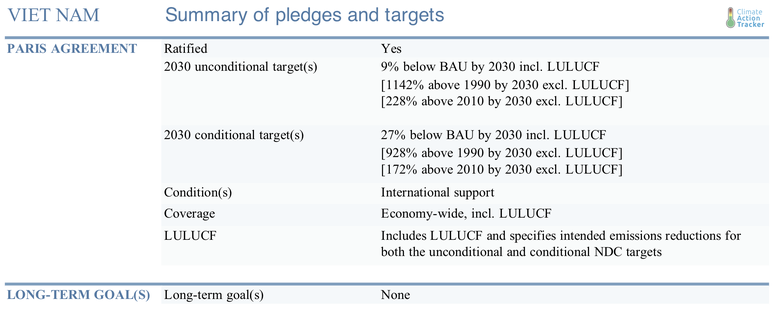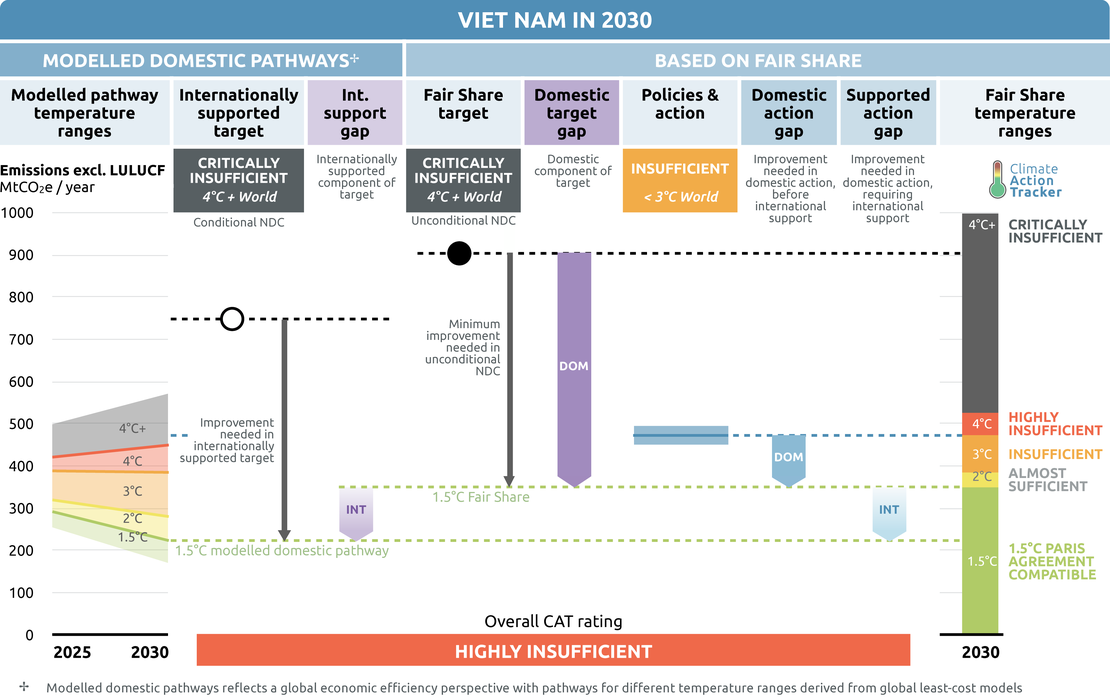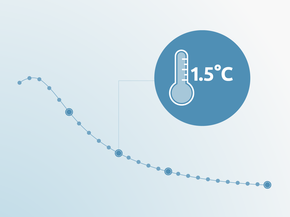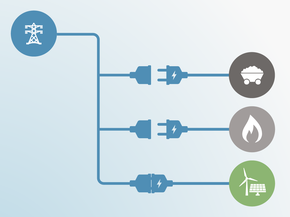Targets
Paris Agreement targets
NDC description
Viet Nam submitted its updated Nationally Determined Contribution (NDC) to the UNFCCC in September 2020 (Viet Nam Government, 2020a). Viet Nam’s updated Nationally Determined Contribution (NDC) includes conditional and unconditional mitigation components. Viet Nam has unconditionally committed to reduce GHG emissions by 9% by 2030 below business-as-usual (BAU) levels. Viet Nam committed to a conditional target of reducing GHG emissions by 27% below BAU based on international support.
The new NDC represents a minor improvement compared to the ambition level of the previous one. The new unconditional target translates to 903 MtCO2e/yr in absolute emissions levels for 2030 (excluding LULUCF). The first NDC of an 8% emissions reduction below BAU did not include the industry sector (nor the high cement emissions in this sector). The CAT calculated that target to be 919 MtCO2e/yr in absolute emissions levels for 2030 (excluding LULUCF) factoring in industry emissions.
The new targets are based on a BAU scenario that has been updated since the first NDC, based on the latest historical data. The new BAU includes emissions from industrial processes and product use (IPPU). CAT added IPPU to the old BAU to make the targets comparable. The new BAU is calculated to be 2% higher compared to the old BAU in emissions levels for 2030 (including IPPU).
A target based on a reduction from current policy projections would ensure real progress in climate action. The current policies projection used by the CAT would offer a more suitable baseline for targets than the very high BAU the Viet Nam government used. The government assumes for that BAU a very optimistic economic growth that does not correspond to past trends.
The CAT rates Viet Nam’s conditional 2030 target (its “internationally supported target”) as “Critically insufficient” against modelled domestic pathways and its unconditional 2030 target (its “fair share target”) as “Critically insufficient” against the fair share contribution.
The CAT rates Viet Nam’s conditional 2030 target (its “internationally supported target”) as “Critically insufficient” against modelled domestic pathways. The “Critically insufficient” rating indicates that Viet Nam’s internationally supported target in 2030 reflects minimal to no action and is not at all consistent with the Paris Agreement’s 1.5°C temperature limit. If all countries were to follow Viet Nam’s approach, warming would exceed 4°C.
The CAT rates Viet Nam’s unconditional 2030 target (its “fair share target”) as “Critically insufficient” against the fair share contribution. The “Critically insufficient” rating indicates that Viet Nam’s fair share target in 2030 reflects minimal to no action and is not at all consistent with the Paris Agreement’s 1.5°C temperature limit. Viet Nam’s target is not in line with any interpretation of a fair approach to meeting the Paris Agreement’s 1.5°C limit. If all countries were to follow Viet Nam’s approach, warming would exceed 4°C.
Further information on how the CAT rates countries (against modelled domestic pathways and fair share) can be found here.
Last NDC update
Viet Nam submitted its NDC update in September 2020, but failed to increase its ambition.
While numerically stronger, it can still be easily met with current policies and will not drive further climate action. We therefore do not consider Viet Nam's target to be stronger than the previous one. The transparency and sectoral coverage of the NDC has improved.

Viet Nam has not submitted its long-term strategy to the UNFCCC, nor has it adopted a net zero target.
The Ministry of Natural Resources and Environment (MONRE) released a new draft law, and if passed MONRE would be responsible for a national plan to reduce GHG emissions, with a strategy to 2050 (Burke et al., 2020).
Summary table

Further analysis
Latest publications
Stay informed
Subscribe to our newsletter







